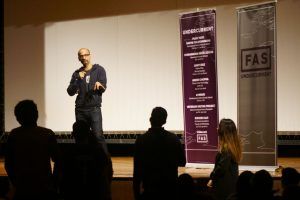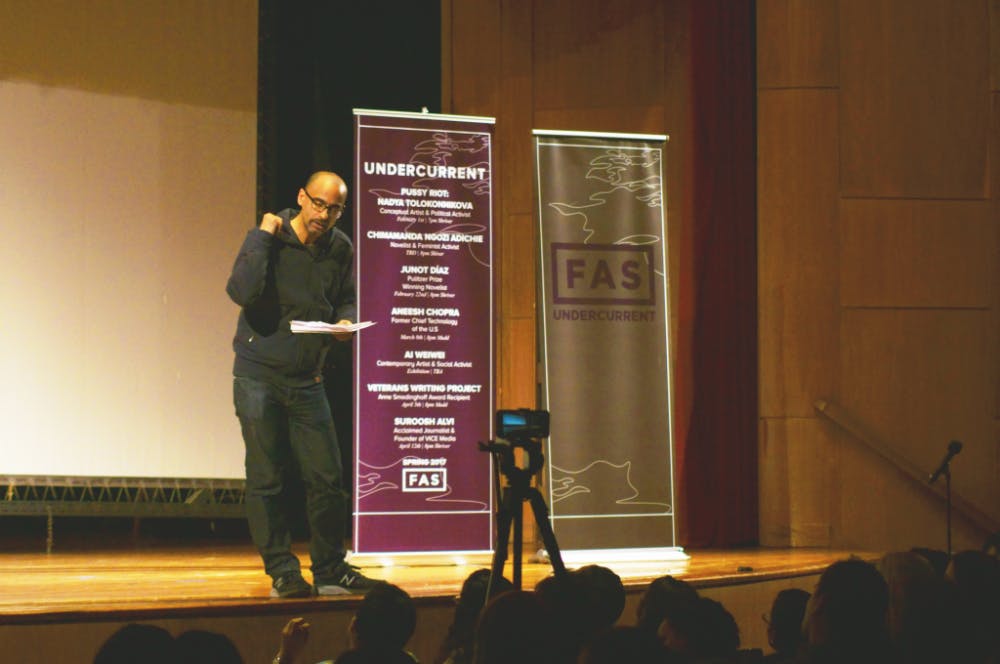Pulitzer Prize-winning author and 2012 MacArthur Fellow Junot Díaz outlined how the current political climate has influenced his creative process at the Foreign Affairs Symposium (FAS).
His talk, which was titled “The Inhuman Condition,” took place on Wednesday in Shriver Hall and focused on the topics of fear, wall-building and the dehumanization of immigrants and other minority groups.
Díaz began by explaining the creative process behind his critically acclaimed novel, The Brief Wondrous Life of Oscar Wao. He explained that he usually structures his stories around the political and social questions that interest him. In his writing, Díaz has explored social activism and the long-term effects of slavery.
“How do people who come out of the plantation, how do people of African descent who spent the first 400 years of their existence having no access to love and intimacy... find their way to finding love?” he asked.
From this point, Díaz argued that artists and politicians in the United States, especially President Donald Trump, draw inspiration from similar socioeconomic and political power structures.
“I’m writing this book years ago, and then Trump pops up and behaves exactly the way that you would expect any kind of monstrous white supremacist leader in America would,” Díaz said. “In many ways, these oppressive leaders — and writers — are tapping into the same disavowed, erased, unacknowledged systems and oppressions.”
However, Díaz emphasized that the crucial difference between artists and right-wing politicians like Trump is how they draw power from these systems.
“[Artists] explore them on a road to liberation, but dictatorial leaders explore them as ways to dominate,” he said. “We end up with our hands in the same water but for very different reasons.”
Díaz introduced his theory of the “The Great Fear,” which encompasses the culture of fear that he believes is permeating American life, particularly among younger generations. He explained how over the course of his life, he has watched a spreading fear of strangers influence people’s interactions with one another.
“Post-sixties and seventies you began to get this saturation of fear culture that in many ways helped to atomize people, to separate people,” he said.

According to Díaz, this alarm is heightened by the culture of intense competition ingrained in people starting from a young age. He pointed to the pressure placed on college students to make the ‘right decisions’ in order to secure a stable future post-graduation living as an example.
“The other thing that we begin to foist on young people growing up is this neoliberal imagery around punishment and scarcity,” he said. “And what young person that’s here at Johns Hopkins doesn’t feel that cruel calculus of this sense that you are living your life on the thinnest edge between happiness and total destruction?”
Díaz then related the topic of fear to American culture’s growing obsession with the need to secure our borders by building literal and metaphorical walls.
“Fear is the central American religion now. One of the great artifacts of this fear is the wall,” he said. “Neoliberalism wants every single one of us to become a border guard. It wants everyone to imagine that contact. The unregulated encounter with other people is not only fearful but dangerous.”
Based on what he has witnessed while teaching at the Massachusetts Institute of Technology, Díaz believes that this fear-inducing rhetoric has also significantly altered the ways students communicate with one another.
“How many of us are by reflex exclusionary? My students are like ‘That person is only half-black; They’re not black,’ ‘She doesn’t speak Korean; She’s not Korean,’ ‘They’ve never been to Malaysia; They’re not Malaysian,’ ‘Your family is X; You can’t be Y,’” he said. “My students are far quicker with the machete, to cut people out, than they are to include people.”
Díaz explained that this drive to create borders between different people is ingrained within white supremacy.
“Nelson Maldonado-Torres has this idea of ‘ego conquiro,’ ‘the conqueror’s logic’ — like me and people of color and poor folks and immigrants are not deserving of human treatment because they are not human at the heart of white supremacy,” he said. “If you’re a person of color, you’re always a probationary human.”
Freshman Julia Costacurta was especially drawn to Díaz’s discussion of neoliberalism and race in light of how it paralleled the current political debate involving immigration.
“One thing that really stood with me was the whole idea of solidarity and how being afraid of strangers is something we’re taught from a very young age,” Costacurta said. “I had never thought about that before, and how that becomes a factor when you become an adult especially within the current political structure.”
Junior Astha Berry also appreciated the tone of Díaz’s talk, particularly the way he addressed the college experience.
“This might even be one of my favorite FAS events of all time. I thought he was very eloquent and down to earth,” Berry said. “I was surprised by how much he swore. I thought it made him very relatable, and I found myself wishing that he was my professor multiple times.”





